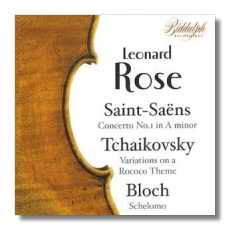
The Internet's Premier Classical Music Source
Related Links
- Latest Reviews
- More Reviews
-
By Composer
-
Collections
DVD & Blu-ray
Books
Concert Reviews
Articles/Interviews
Software
Audio
Search Amazon
Recommended Links
Site News
 CD Review
CD Review
Leonard Rose Plays

- Camille Saint-Saëns: Cello Concerto #1 in A minor 1
- Ernest Bloch: Schelomo 1
- Piotr Ilyitch Tchaikovsky: Variations on a Rococo Theme 2
- Jules Massenet: Élégie 3
- Edwin Greene: Sing Me to Sleep 3
Leonard Rose, cello
1 New York Philharmonic Orchestra/Dimitri Mitropoulos
2 New York Philharmonic Orchestra/George Szell
3 Gladys Swarthout, mezzo-soprano
3 Gibner King, piano
Biddulph 80209-2 ADD monaural 67:20
Cellist Leonard Rose has been relatively neglected in the CD era, so it is good that Biddulph Records and producer Eric Wen have turned their attentions to reissuing several choice recordings that he made between 1949 and 1952. Born in Washington, DC in 1918, the son of Russian emigrants, Rose's first lessons on the cello came from his father. Later, he studied at the Miami Conservatory and at the Curtis Institute of Music in Philadelphia. He joined the NBC Symphony Orchestra in 1938, and held principal posts with the Cleveland Orchestra and the New York Philharmonic in quick succession. It wasn't until 1951, though, that he earnestly launched his career as a solo cellist. From then until his death in 1984, he gained fame not just as a soloist but also as a chamber musician. He also was an influential pedagogue; Yo-Yo Ma was among his most illustrious pupils.
The Saint-Saëns and Bloch were recorded in April 1951, right at the start of Rose's solo career. I've had the LP in my collection for a while, and it's been a standby whenever I've wanted to hear a Schelomo that is emotional but under control. Rose shows his roots in Bloch's "Hebrew Rhapsody," but he never distorts the music by imitating cantorial wailings, as some cellists have done in this work. The Saint-Saëns is played with panache and a gratifying lightness. Less than a year later, Rose recorded the Tchaikovsky Variations on a Rococo Theme, but this time with George Szell replacing Mitropoulos. The Hungarian ran a tighter ship than the Greek, so here's a reading characterized by precision, but no lack of charm. (Rose and Szell play the slightly abbreviated Fitzenhagen edition of the score.) As an encore, we are given two sentimental songs by Massenet and Greene, in which Rose is joined by mezzo-soprano Gladys Swarthout (not "Swartout," as Biddulph's booklet repeatedly insists) and pianist Gibner King. (Swarthout was a famous Carmen at the Metropolitan Opera.) These were recorded in 1949, and are excellently performed, although, as far as the music goes, they belong next to the potted aspidistra in the front foyer. Throughout this CD, Rose's warm and classy tone is on display. He was a "neat" cellist, never sacrificing beauty of sound to expression.
The transfers are by Gary Stucka. My LPs are brighter than the sound preserved here, and I fear a little something has been filtered out, although Rose's artistry remains most impressive. For recordings more than a half-century old, they have held up nicely. These recordings have not appeared on CD previously.
Copyright © 2004, Raymond Tuttle

















